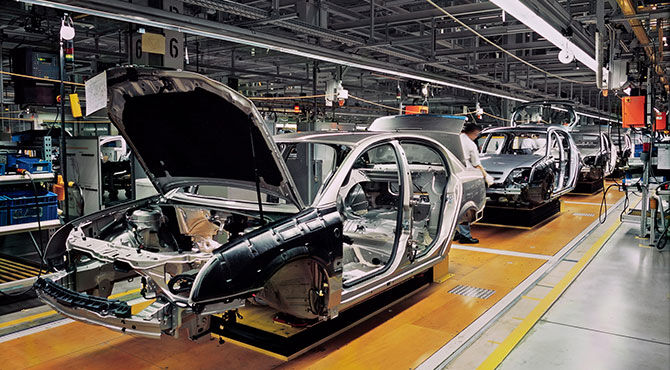UK economic growth disappoints in first quarter
The first quarter of 2018 saw a significant slow down in the UK’s economic growth. Poor weather conditions and weakened real wages are believed to have had an impact.

 27 April 2018
27 April 2018Weakest growth in UK GDP since 2012
Despite a 0.3 per cent rise in the all-important services sector, the Office for National Statistics (ONS) revealed on Friday that gross domestic product (GDP) had grown by only 0.1 per cent in Q1 – the weakest quarterly growth since the fourth quarter of 2012 and much worse than the 0.3 per cent growth most analysts had been predicting.Severe weather between January-March, including snowstorms and freezing temperatures dubbed the ‘Beast from the East’, had been expected to hit GDP, but the ONS said the weather was only minimally responsible for the poor showing.ONS spokesman Rob Kent-Smith said, “Our initial estimate shows the UK economy growing at its slowest pace in more than five years, with with weaker manufacturing growth, subdued consumer facing industries and construction output falling significantly.“While the snow had some impact on the economy, particularly in construction and some areas of retail, it overall effect was limited with the bad weather actually boosting energy supplies and online sales.”The ONS data prompted an immediate drop in the value of sterling against both the dollar and euro.Related stories:
- UK manufacturing most vulnerable to cyber-crime
- Quarter of London companies ‘eyeing overseas moves’
- Can Birmingham compete with London on tech talent attraction?
Alpesh Paleja, principal economist at the Confederation of British Industry (CBI), said, “While the Beast from the East has clearly had an impact on economic growth, particularly on the construction and retail sectors, the ONS also highlighted weaker growth in other sectors, especially manufacturing.“More broadly, momentum in the economy has remained subdued over the past year, as the squeeze on real pay has held back household spending, and businesses have been grappling with ongoing uncertainty over Brexit.“To give businesses the reassurance they need, and build on the recent progress in agreeing a transition period, other hurdles on the Brexit path need to be cleared in the same spirit of compromise.”Tej Parikh, senior economist at the Institute of Directors, added, “The economic growth figures are particularly disappointing. Although a dip was expected, it was not anticipated to be this sharp.“The icy weather slowed industrial deliveries, grounded construction projects, and pushed consumers off the high street, so some cooling was expected. But it clear that some further underlying weakness persists in the economy.“It should hopefully bounce back this quarter. Some of the business activity lost due to the snow will be recovered over the coming months, leading to a rebound in the figures. Consumer spending power will also be bolstered by the fall in inflation. “But, the bigger picture remains one of a safe but sluggish economy. Confidence amongst business leaders, whilst no longer outright pessimistic, remains very much on the fence, and that is largely a result of the ongoing uncertainty surrounding the precise nature of Brexit.”
Interest rates in the UK
On the implications for the Bank of England’s May decision on whether or not to raise interest rates, Mr Parikh said, “For the Bank of England, weaker economic growth certainly throws a spanner in the works. An interest rate rise next month has long been on the cards but today’s data, alongside the need for clearer evidence of growing wage pressures, calls that into question. The Bank will need to be certain that the drop in economic growth in Q1 was only temporary.” Samuel Tombs, chief UK economist at Pantheon Macroeconomics, believed the chances of rate rise in May was “now close to zero” because of the slowdown in GDP growth.“The week-long period of heavy snow in late February and early March certainly contributed to the sharp 3.3 per cent quarter-on-quarter fall in construction output and the slowdown in growth in services output to 0.3 per cent, from 0.4 per cent in quarter four,” he said.“But note that construction output fell by a huge 3.1 per cent month to month in January-before the snow hit-while the trend in retail sales and manufacturing output had already started to weaken at the start of the quarter. The snow, therefore, isn’t entirely to blame for quarter one’s slowdown.”Dr Adam Marshall, director-general of the British Chambers of Commerce (BCC), commented, “Sadly, the latest GDP figures confirm what we have been saying for some time: the UK is stuck in the global growth slow lane, while other countries race ahead.“Westminster politicians need to start focusing their attention on a much stronger, more proactive drive to boost growth and investment. While the ‘Beast from the East’ clearly had an impact in the first quarter, the underlying slow-growth trend is real cause for concern.”A government spokesman accepted the figures were disappointed but insisted the underlying fundamentals of the UK economy were sound.For related news and features, visit our Enterprise section. Find out more about our upcoming Relocate Awards. Relocate’s new Global Mobility Toolkit provides free information, practical advice and support for HR, global mobility managers and global teams operating overseas. Access hundreds of global services and suppliers in our Online Directory
Access hundreds of global services and suppliers in our Online Directory
©2026 Re:locate magazine, published by Profile Locations, Spray Hill, Hastings Road, Lamberhurst, Kent TN3 8JB. All rights reserved. This publication (or any part thereof) may not be reproduced in any form without the prior written permission of Profile Locations. Profile Locations accepts no liability for the accuracy of the contents or any opinions expressed herein.























